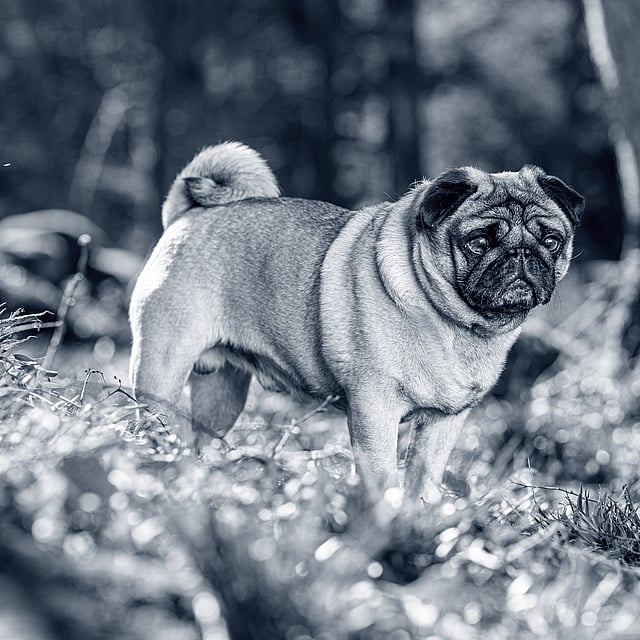As a leading provider of high quality-veterinary care, AniCura encourages healthy and ethical breeding and supports breeders who take a responsible approach. For flat-faced breeds in particular, we strongly advise against breeding animals with known, or strongly suspected, clinical symptoms of brachycephalic conformation.
One of the many benefits of being a part of AniCura is the opportunity to work together and share knowledge between animal hospitals and clinics. AniCura has severa medical interest groups (MIGs) that bring together people with similar interest to share knowledge and provide the latest findings in every area of veterinary medicine.
The theme for the AniCura Medical Interest Group Congress last year was “brachycephalic dogs and cats”. Twenty-seven AniCura experts within fourteen different medical fields shared their knowledge and insights on special conditions in brachycephalic pets. The digital event generated significant engagement with 825 participating AniCura Associates as well as frequent use of the recorded lectures. All speakers signed an agreement which was subsequently accepted as an official AniCura statement.
- AniCura recommends if you are looking for a pet to pay close attention to any health risks in that breed and research the breeder and the pedigree of the pet. We strongly urge new owners not to buy extremely short-nosed animals which can often have been imported illegally from other countries. We support any actions to improve responsible breeding because of the severe animal welfare issues we see with flat-faced dogs and cats coming to our clinics. We will support breeding only when we can expect a healthy offspring and a natural delivery, says Jacques Bonin, Chief Medical Officer at AniCura.
The Netherlands was the first country in the world to legislate to prohibit the breeding of dogs with snouts that are considered to be too short. To increase awareness about the problems linked to short-snouted pets, a campaign was initiated titled “Don’t buy a short snout”, which encourages dog buyers to avoid purchasing extremely short-snouted breeds.
This campaign was initiated by the veterinarians of Caring Vets and the Companion Animal cluster of the professional association of veterinarians, and the animal welfare organizations DierenLot, Sophia-Vereeniging and Dier&Recht.
AniCura supported this campaign and more information is available online on the campaign site. To further support and provide information to veterinarians and other professionals, a free information package for waiting rooms in veterinary clinics has been created.
Pet owners who already own a flat-faced pet are welcome to visit AniCura’s clinics to ask our veterinarians for advice. There are several treatments provided at AniCura’s clinics that can help improve the pet’s quality of life. Surgery to widen the nostrils, shorten the palate and remove excess mucosal folds allows improved airflow through your pet’s nose. The fold of skin on the nose can also be removed to prevent and avoid painful inflammation and eye damage. Sometimes corrective surgery on the eyelids is necessary to prevent eye infections.
- Individual patients and their owners are given the best possible care at AniCura’s clinics and hospitals, regardless of breed. We aim for the best possible medical outcome for each patient, within the framework of good animal welfare, says Jacques Bonin.
Common problems seen in flat-faced pets:
- Shortness of breath
- Eye damage and eye diseases
- Overheating
- Sleeping problems
- Dental problems
- Inflammation in the nasal fold
- Back and neck hernia
For more information, please contact:
Ulrika Grönlund, DVM, PhD, Associate Prof.
Sustainability & Veterinary Medical Communications Manager
+46 706 38 75 62
ulrika.gronlund@anicuragroup.com
About AniCura:
AniCura is a family of animal hospitals and clinics specialised in veterinary care for companion animals. Born out of the idea that sharing resources creates opportunities for better veterinary care, the company was established in 2011 as the first merger of companion animal hospitals in the Nordic region. Today, AniCura is a role model within specialised veterinary care and a valued partner for pet owners and referring veterinarians across Europe.
AniCura offers a wide range of high-quality medical services covering preventive and basic health care as well as advanced diagnostics, internal medicine, intensive care, surgery, and orthopaedics. AniCura also provides rehabilitation, physiotherapy and dietary advice and offers selected pet food and care products.
AniCura provides modern, high-quality veterinary care for pets at 450 European locations and creates peace of mind for pet owners through excellent access and patient safety. Every year, AniCura’s 11,000 passionate veterinary professionals attend to 3.6 million companion animal patients. AniCura is a trusted training and referral body.
Since 2018, AniCura is part of Mars Veterinary Health, a family-owned company focused on veterinary care.
For information on how AniCura is working to shape the future of veterinary care, please visit our website www.anicuragroup.com
